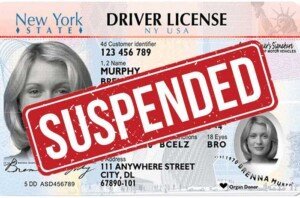New Protection for Those Facing Loss of NY Driver’s License for Back Taxes
Many taxpayers don’t realize New York State can suspend their driver’s license in certain circumstances if they owe back taxes. The State can suspend a taxpayer’s New York State Driver’s License if: (1) A taxpayer owes $10,000 or more in taxes, penalties, or interest, and (2) No collection resolution is in place (such as an Installment Payment Agreement, Income Execution or Offer in Compromise). 
Avoiding Suspension
Prior to the law change, New York Tax Law section 171-v (5) specified that a taxpayer may only challenge suspension of the license or referral for suspension on the grounds that:
- The individual to whom the notice was provided is not the taxpayer at issue;
- The past-due tax liabilities were satisfied;
- The taxpayer’s wages are being garnished by the Department for the payment of the past-due tax liabilities at issue or for past-due child support or combined child and spousal support arrears;
- The taxpayer’s wages are being garnished for the payment of past-due child support or combined child and spousal support arrears pursuant to an income execution issued under section 5241 of the civil practice law and rules;
- The taxpayer’s driver’s license is a commercial license; or
- The Department incorrectly found that the taxpayer has failed to comply with the terms of a payment arrangement made with the Commissioner more than once within a twelve-month period.
As mentioned above, the original law contained no hardship exception, as exists with child support enforcement laws.
This provision has now been amended to add 2 more grounds for challenging suspension. These include:
- The taxpayer receives public assistance or supplemental security income; or
- The taxpayer demonstrates that suspension of the taxpayer’s driver’s license will cause the taxpayer undue economic hardship.
Other Exceptions to the Law
There are a few other exceptions to the suspension law. For example, a license may not be suspended for taxpayers who are seeking innocent spouse relief or those for whom enforcement of past liabilities has been stayed by a petition in Bankruptcy.
In addition, New York State will allow limited suspensions in some cases. Taxpayers may apply for a restricted driver’s license, which permits the individual to travel only to and from work, school, medical appointments, the DMV, and childcare related to employment or education. The taxpayer must return directly home from those locations. Those who are retired or unemployed do not appear to be eligible for a restricted license.
Although the amended law is welcome protection for taxpayers facing undue hardship if they lose their license, the state still has other ways to collect on tax debts. The state may use liens, levies, wage garnishment, and other enforcement tools. Ultimately, taxpayers who owe back taxes must settle their tax debts. New York offers several programs to help, such as an Offer-in-Compromise, Installment Payment Agreement, and other options.


